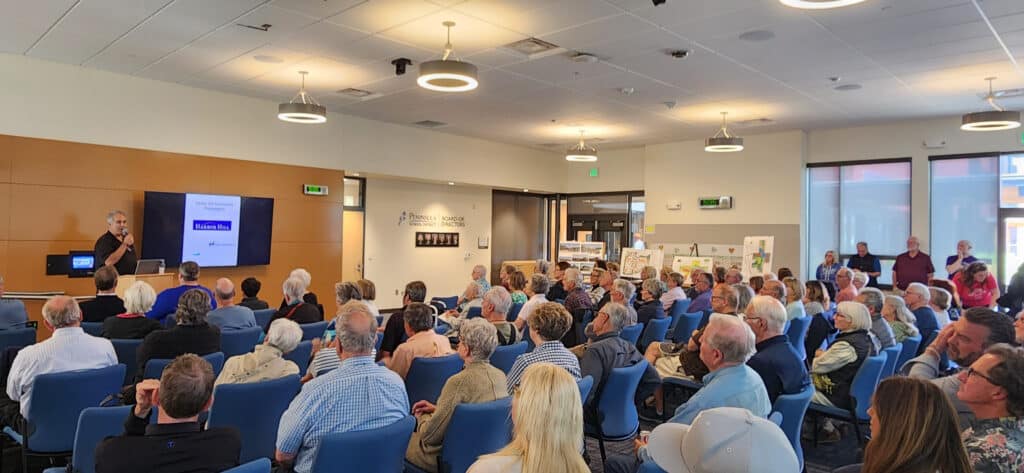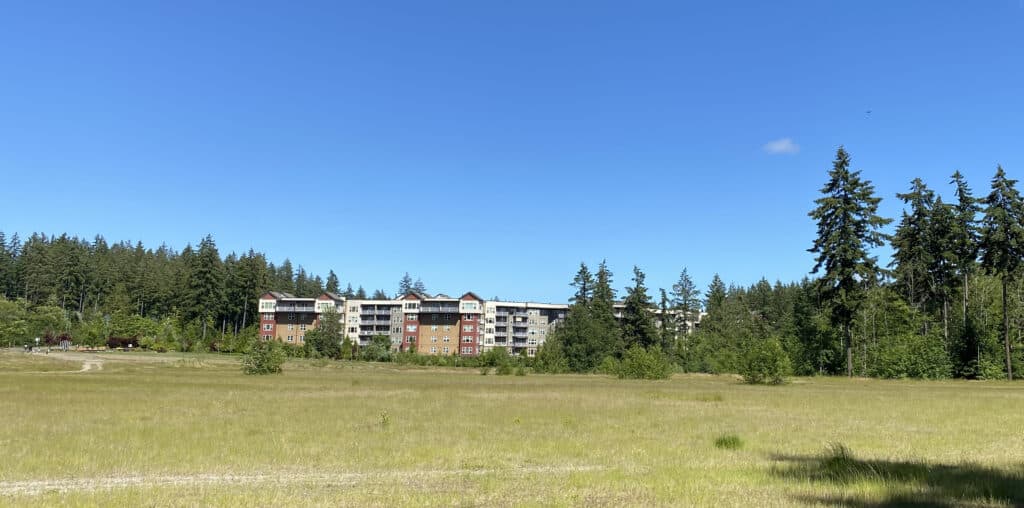Business Community Environment Government
Village at Harbor Hill still waiting on an anchor-tenant grocer
For Gig Harbor North residents eager for the long-promised Village at Harbor Hill upscale commercial project to enliven their neighborhood, Tuesday evening’s meeting with the developers at Swift Water Elementary School could seem like the worst of times.
“I wish I had some amazing news, so let me let you down now,” said Jon Rose, vice president of Raydient, a subsidiary of property owner Rayonier. He said that despite knocking on many doors, the developers are not even close to landing a grocery store to anchor the 18.5 acre project.
At several points in the meeting, Rose and Peter Powell of retail specialist Powell Development said frustration over finding a grocer as anchor tenant might cause them to walk away from the project — or switch to a development concept that differs drastically from the current proposal for 14 buildings and 154,447 square feet of new retail space.

Is the Village at Harbor Hill really coming soon? Photo by Ted Kenney
Trader Joe’s representative attended
But the meeting, hosted jointly by the developers and the city of Gig Harbor, also included moments of hope and even excitement. One came when Gig Harbor City Administrator Katrina Knutson disclosed that a representative of Trader Joe’s was in the audience.
Knutson declined to identify the person, other than to say they work in management at the Trader Joe’s University Place store. She said their private conversation that evening gave her hope that by providing the company with new data on resident income and other demographics, the city could earn a meeting with Trader Joe’s to pitch a Gig Harbor location, despite past rejections.
The mention of this Holy Grail of upscale grocers drew more applause and exhortations of delight from the audience than anything else discussed Tuesday night.
Residents have been waiting more than a decade for the Village at Harbor Hill to materialize. In 2015, Town & Country Markets was onboard as the lead tenant, but the deal fell apart due to spiraling costs in the construction sector, Rose said. Then the project was stymied by a lawsuit between the developers and the city of Gig Harbor over traffic impact fees, by Covid, and most recently by industry mergers that have led to the major grocers shutting and selling off stores instead of opening new ones.

Raydient VP Jon Rose addresses a community meeting on the future of Village at Harbor Hill on Tuesday evening. The event, sponsored jointly by developers Raydient (subsidiary of property owner Rayonier) and Powell Development and the city of Gig Harbor, drew an estimated 100 people to Swift Water Elementary School. Photo courtesy of Raydient
Changes in shopping trends
Another challenge, according to the developers, is that online shopping has weakened middle-tier or “mid-box” stores, taking away another linchpin in Village at Harbor Hill’s current business plan. They said the project initially lined up mid-box retailer Ulta Beauty and one of the middle-tier store brands owned by TJX Companies (they have TJ Maxx, HomeGoods, Marshalls and others), but lost these tenants as part of that market segment’s pullback.
At its peak, Village at Harbor Hill had tenants for 80 percent of its non-anchor retail space, but some 28 to 29 percent of these smaller retailers have dropped out in the years since the project stalled, Powell said.
“We’re looking for ideas” on how to move forward with the project in the face of these challenges, Peter Powell said.
As much as anything, the meeting was a brainstorming session, with the developers and residents batting around names of a dozen or so potential retail anchors. Besides Trader Joe’s, these included Sprouts Farmers Market, Aldi, PCC Community Markets, New Seasons Market and even REI. The suggestion of a Winco Foods sparked a mixed reaction, with some in the audience rejecting the more downmarket grocery store and others embracing the possibility of spending less for staples.
“Chicken is chicken. I’d be willing to buy” it at a lower price, said Karen Coles, resident of Heron’s Key retirement community adjoining the Village at Harbor Hill site. She said that her family already drives some distance to shop at Winco.
“I don’t think a lesser grocer is going to be a problem” at the Village development, Coles said.

The Village at Harbor Hill site is completely vacant. Heron’s Key retirement center is in the background. Photo by Ted Kenney
‘You’re the elite’
Powell downplayed the possibility of Winco placing a store in Gig Harbor North because the company usually seeks a lower-income community. “You are the elite,” he told the audience.
Powell said he was willing to talk to Winco again on behalf of residents, but he drew the line at working with the even more downscale Grocery Outlet. “I just don’t think you guys deserve that. You deserve the best,” he said.
Neighbors of the Village at Harbor Hill site suggested e-mail or letter campaigns to the retailers they favored, and the developers endorsed this idea. In one concrete takeaway from the meeting, Gig Harbor’s Knutson committed to setting up a Listserv “to communicate updates regarding The Village, to include contact information, opportunities for the public to contact particular grocers, and to receive public input opportunities.”
If a grocery store anchor tenant materialized today, the Village at Harbor Hill could break ground as soon as two years from now, Rose said.
Mixed-use development?
Perhaps inevitably, given the developers’ frustration signing up a grocery store for the Village, talk at the meeting turned to scrapping the current plan and replacing it with one that does not hinge on such an anchor tenant. Attendees, including Gig Harbor City Councilmember Roger Henderson, raised the idea of pursuing mixed-use development that combined housing and smaller businesses and offices.
Rose said one reason they’ve focused on retail anchored by a large grocery store is that banks that would finance the project view this as a “tried and true” moneymaker. But he allowed that over the past decade-and-a-half, banks have come around to supporting mixed use projects.
Knutson said the city would work with the developers if they decided to try another approach. The property’s zoning is flexible enough to allow a variety of uses, and the sewer and water are already in place, she said. The city’s turnaround on such a change “won’t be quick but it could be government-quick, if the community is onboard,” Knutson said.
Another resident asked, what if the developers went with building a smaller shopping center and leaving more of the site in open space?
“We would absolutely entertain any of the ideas that have been raised today, including that one,” Powell responded.
However, “for the open space project to be attractive [to the developers], that open space will need a purchaser. In the past the City has purchased land from us to create public spaces and parks,” such as the city’s sports complex now under construction near the Village at Harbor Hill site, Rose said in an e-mail.
‘Several possibilities’ for Village at Harbor Hill
In an e-mail, Rose addressed scenarios in which Raydient and Powell Development might exit the project. “There are several possibilities. First, someone could just bring an unsolicited offer for the property. If the offer is substantial enough we would have to give it serious consideration,” he said.
“Second, we may get to the point of actually listing the property for sale. That is the easiest way to draw attention to the site for a) a bulk purchaser or b) a particular user that we are not familiar with. If enough of the right kind of users came out of the woodwork we might take a fresh look at the project,” Rose wrote.
Rose declined to say how long the developers would continue to look for a grocer tenant before walking away or shifting the project’s focus to mixed use or another concept. But he said the they would like to stay involved at least through the comprehensive plan update in progress this year. That may be “an opportunity to bring new vision and energy to the project.”
“We are intrigued by the ideas suggested by the community during the meeting,” Rose said. “We will study the concept of bringing a mixed-use vibe to the project. Adding residents on the site helps increases the potential for grocery and restaurant sales and really upscales the project vision. We’d like to see how this plays out before considering just a sale of the project.”
